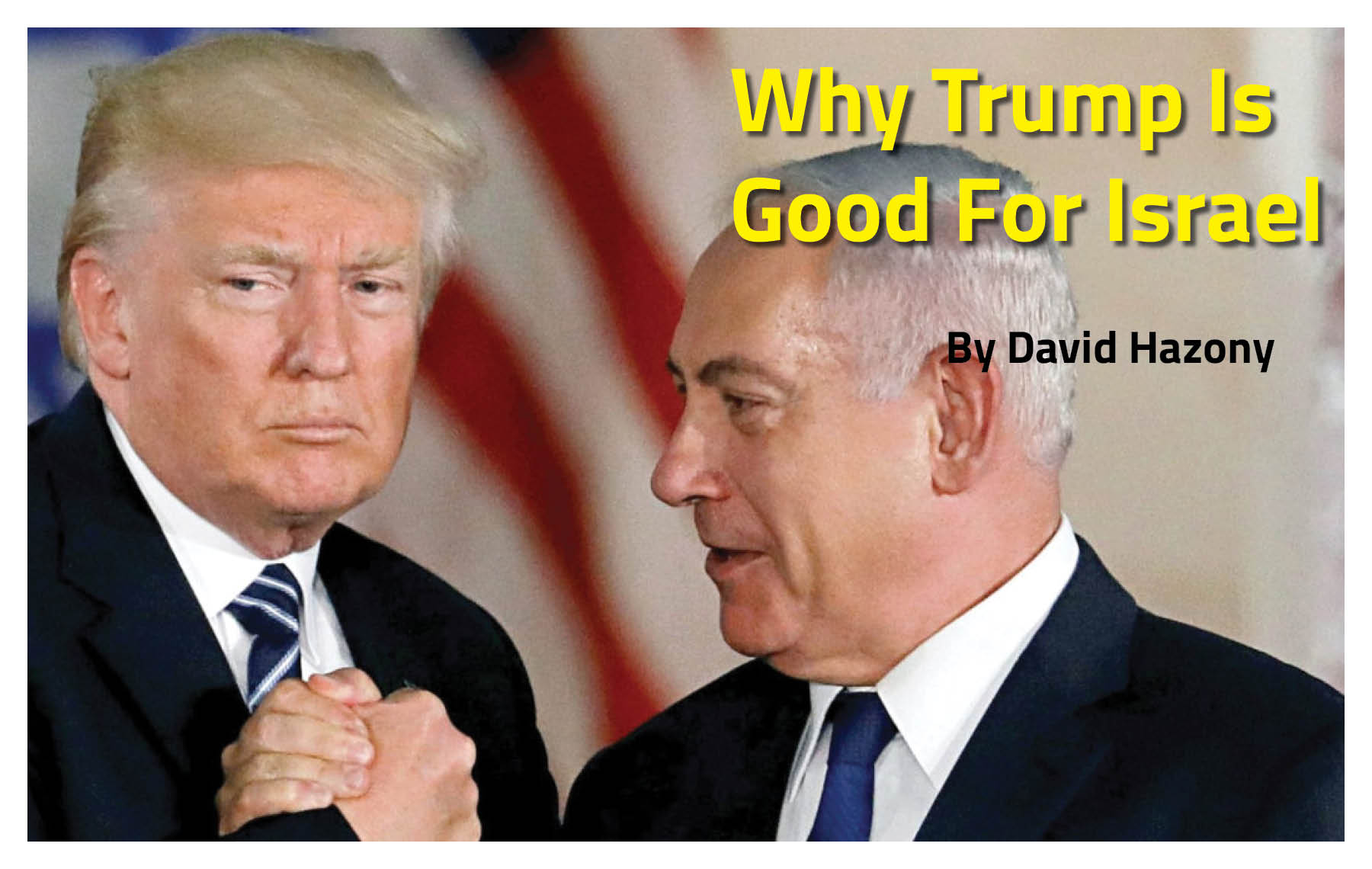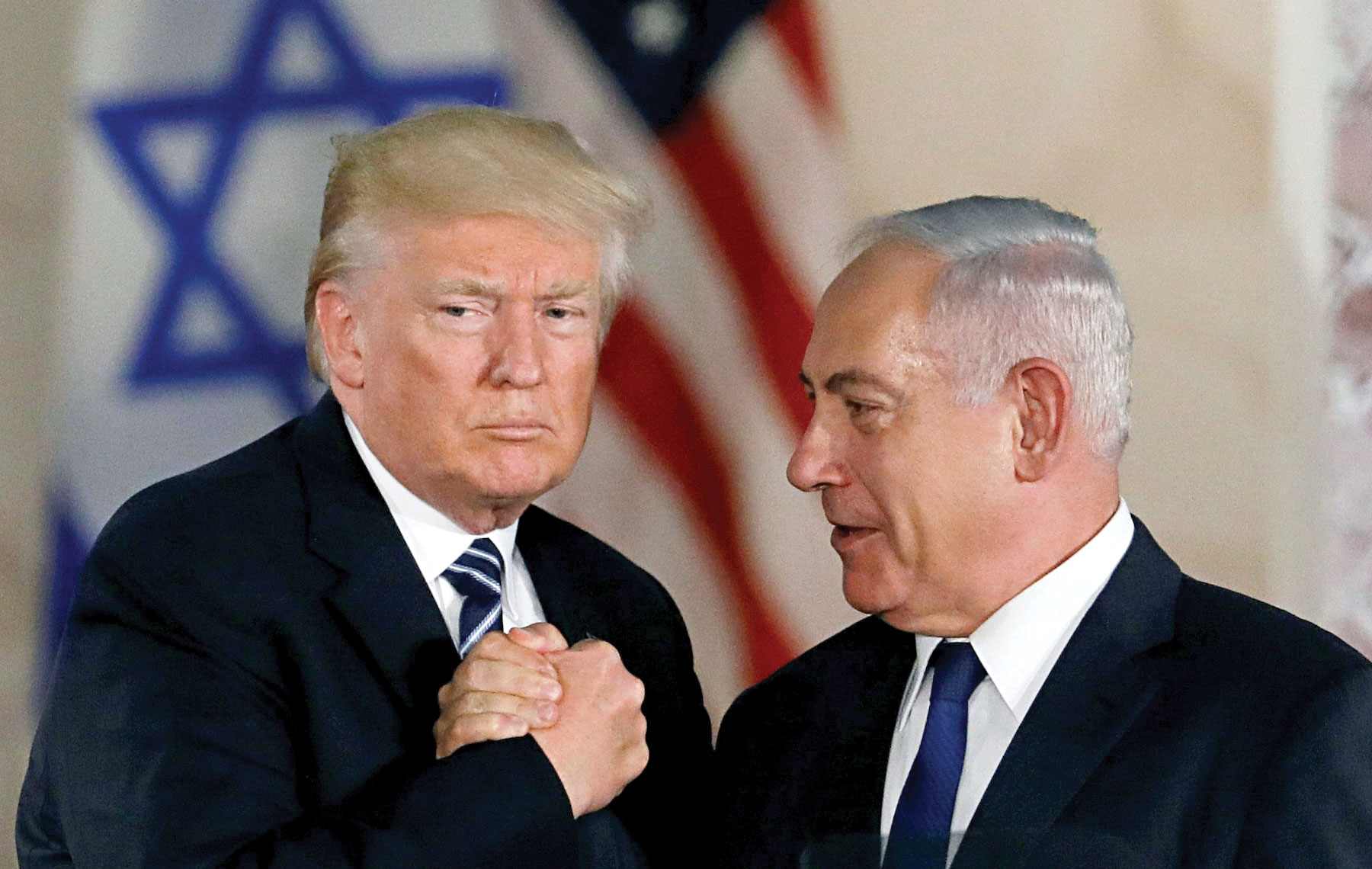

I know the risk I take when I say anything positive about President Donald Trump in today’s climate of self-congratulatory partisan idiocy. My friends in Washington, D.C., who dared weigh things on their merits, who wrote things like “regardless of what you think about him in general, on this one issue he may be right,” have been assaulted like a bad implant swarmed by antibodies.
As an Israeli, I will be forgiven for caring less about newly minted Supreme Court Justice Brett Kavanaugh, dog whistles, white supremacists and what happens at the U.S.-Mexico border than I do about foreign policy and, especially, Israel policy.
And in that arena, Trump, in his brash style, his flouting of norms, his calling allies to order and enemies by name, his willingness to use power unpredictably to advance clearly defined interests, his intuitive and accurate grasp of regional and global power maps, and his rebuilding of American military might and sovereign will — he has not made America weak, and certainly has not made Israel weak.
Very much the opposite.
When I was in high school in Boston in the 1980s, I was surrounded by teachers and friends who were convinced that Ronald Reagan was the worst president in American history, and that words and actions toward the mighty Soviet Union were “crazy” and going to result in “everybody dying in a thermonuclear war.”
Nothing drove them more nuts than American victory in the Cold War. To this day, they scramble to attribute the fall of the Soviet Union to anything other than Reagan.
So write it on the balloons at your next gala dinner: Donald Trump is, so far at least, very good for Israel.
What does Israel really need?
Well, what does any small country need when it’s trying to succeed in a volatile neighborhood? It needs geostrategic tailwinds from powerful allies. It needs enemies and friends alike to think the country should not be messed with. It needs help carving out a strategic “safe space” so it can navigate complicated and changing power constellations, and the room to let its economy grow.
Yes, advanced weapons and money help. But more important is the clarity: the consistent, unambiguous public backing, in words and deeds, from the most powerful country on Earth.
“What does Israel really need? Yes, advanced weapons and money help. But more important is the clarity: the consistent, unambiguous public backing, in words and deeds, from the most powerful country on Earth. In this, Trump is helping Israel more than his predecessor did.”
In this, Trump is helping Israel more than his predecessor did, and maybe even more than the ones before did.
Former President Barack Obama was, at best, an unreliable ally. He never failed to remind Israelis that he kept up the aid money. But he knew and we knew that the actual importance of that $4 billion has shrunk dramatically when seen as a percentage of Israel’s budget or its GDP (now around 3 percent and 1 percent, respectively). Today the money is the least important component of the United States’ strategic support. The U.S. could cut it off tomorrow without much of a blip on Israel’s balance sheet, much less the instant holocaust that American Jews usually assume would follow.
Yet on the things that counted, Obama worked against Israel’s strategic needs. He cut a deal with Israel’s most dangerous enemy, Iran, that delayed its nuclear program (which it didn’t really need), but gave the regime instead what it desperately did need — billions of dollars and a U.S. commitment to turn them into a “very successful regional power” (Obama’s words). Obama waffled on Syria, fueling its instability and expanding Iran’s reach. And let’s not forget his unprecedented slam-the-door-behind-you abstention on the anti-Israel U.N. Security Council Resolution 2334 in December 2016, after the moving vans had arrived on the White House lawn. These were not the acts of a friend.
Trump’s support has, by contrast, been unambiguous where it counts: The words and actions that tell everybody which way the winds are blowing.
This is why moving the American Embassy to Jerusalem was so valuable, as were closing the Palestine Liberation Organization office in Washington, restoring sanctions on Iran, and main-taining intolerance for U.N. hostility and Palestinian pay-to-slay policies. Taken together, these actions have sent a clear signal to the world, one that makes my children safer.
And we have seen the results. Did anybody notice how Russia entered into an uncomfortable alliance with Iran to prop up Syrian President Bashar Assad, and yet has been forced by the new reality to tolerate Israeli air strikes against Iranian military assets across the country? Did anybody notice that these airstrikes ramped up immediately after Trump’s cancellation of the Iran deal? I’d love to be in that room where the Russians are trying to explain to the Iranians why they keep letting Israel do that.
That’s why I’m a lot less worried about a Trump peace plan than I was about the Oslo Accords and the other very bad ideas American diplomats have tried in the past.
Things have changed. The Palestinians, whose cause went global in the 1960s because the Arab states and the Soviet Union needed a propaganda weapon against the West, now have lost both of their backers: The Soviets are gone, while Egypt and the Gulf States have understood the power of the Israel-U.S. alliance. For them, the Palestinian cause has outlived its usefulness.
Yes, you still have hordes of hung-over students shouting, “Apartheid!” and cheering on while Hamas sends fire balloons across the border. But in terms of real power, the Palestinians are today isolated, flat-footed, flailing for money, internally torn, rudderless, with leaders who do nothing to advance either their economic or national aspirations, who only perpetuate their misery.
In such a context, we can imagine the impasse being broken. For in most conflicts, peace happens only when one side loses, or senses it’s about to. Most peace deals are little more than a resignation to prevent the indignity of a checkmate. It’s not likely in this case, but it’s far from impossible.
So, as much as you want to incorporate Israel into your narrative about how horrible Trump is for everything, in the case of Israel, it just sounds like a silly, desperate talking point. And it surely doesn’t help the prospects of peace.
READ MORE: “WHY TRUMP IS BAD FOR ISRAEL”
David Hazony is an author and executive director of The Israel Innovation Fund, a nonprofit dedicated to promoting Israeli culture in the world.






















 More news and opinions than at a Shabbat dinner, right in your inbox.
More news and opinions than at a Shabbat dinner, right in your inbox.